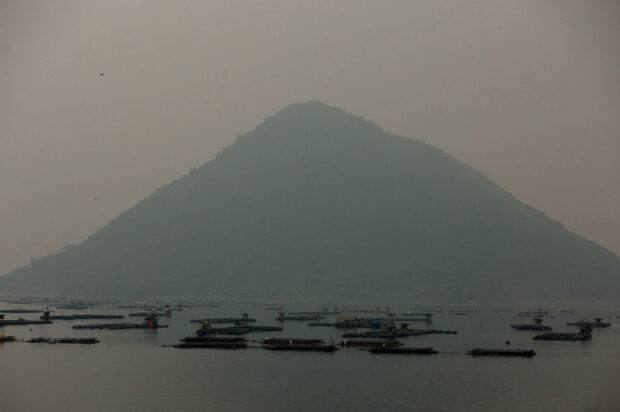
DANGER IN THE AIR Taal Volcano is swathed in a mist of hazardous sulfur dioxide as seen from Agoncillo town, Batangas province. —RICHARDA. REYES
LUCENA CITY, Quezon—Jillian Therese Dumas, 32, a mother of three and a resident of Tolentino East village in Tagaytay City, had to rummage through her cabinet again to find her old stocks of face masks.
Her children, ages 2, 6 and 10, have been suffering from cough for the past two days since Taal Volcano began emitting volcanic sulfur dioxide (SO2) gas.
“I have to protect my three kids from the toxic volcanic smog. Wearing a face mask even inside the house is again a must for them,” Dumas told the Inquirer in a phone interview on Friday.
“It’s good that we still have remaining stocks of surgical face masks after the pandemic,” she said.
According to Dumas, the view of scenic Taal Volcano from the city was covered with vog, or air pollution caused by volcanic emissions.
‘Terrible and nauseating’
“The air quality is not good. The vog has a sulfuric smell, especially when it’s raining. It’s suffocating,” said Dumas.
Other residents likened that odor to a strong smell of wood burned by gasoline, which is painful to the throat.Shermin Tan, 46, who works for a printing press in Tagaytay City, said he had been down with a cold and feeling unwell since Thursday.
“The sulfuric smell is terrible and nauseating, especially after the rain,” he said over the phone.
A resident of Tagaytay for 40 years now, Tan said he has witnessed several eruptions and volcanic unrest.
“But this volcanic smog or vog is different. It is really irritating to the body. It is not advisable to stay out of the house, especially for oldies and sick persons. And even when inside, face mask is a must wear,” he said.
Tan said his uncle, who lives next door, has been complaining of a harsh cough since Thursday.
‘First experience’
“My uncle went to Manila this morning to escape the vog,” he said.
Jackie de Taza, who heads the Municipal Disaster Risk Reduction and Management Office in Tuy, Batangas province, said the spread of the vog in the municipality was caused by a sudden change of the wind’s direction.
“The large vog on Thursday was our first experience in our town. Even during the past volcano unrests, there was no volcanic smog around us,” De Taza said in a phone interview on Friday afternoon.
She said at least 58 high schoolers from three schools in Tuy had been brought to medical facilities in the town for emergency treatment due to sickness associated with the vog.
But most have been cleared as of Friday and only one of them is still confined due to asthma, De Taza said.
Also on Friday, six high school students in Balete town were reported to have experienced skin irritation, difficulty in breathing and asthma attacks.
Even early this month, at least 36 students in Mataas na Kahoy town were treated due to chest pains and difficulty in breathing associated with dizziness.
‘Code white’
The Department of Health (DOH) in the Calabarzon (Cavite, Laguna, Batangas, Rizal, Quezon) region issued an advisory on Friday urging the public to remain cautious over the high levels of SO2 emissions from Taal.
“Vog can be harmful to health and may cause irritation to the eyes, throat, and respiratory tract, which can become severe depending on the concentration or duration of exposure,” said DOH-Calabarzon.
A “code white alert” has been raised since Thursday, and the agency advised residents around the volcano “to stay indoors as much as possible.”
The alert status refers to the readiness of the hospital workforce to respond to an emergency situation.
Residents were also advised to wear N95 masks, drink water frequently and seek medical attention if needed.
In a statement, Ariel Valencia, DOH-Calabarzon director, warned that “vog should not be taken lightly as sulfur dioxide poses a serious threat to human health that can cause eye and throat irritation and respiratory diseases.”
Classes in public and private schools in Batangas and Cavite provinces and some municipalities in Laguna and Rizal provinces were suspended on Friday to ensure the safety of students and teachers, the Calabarzon Regional Disaster Risk Reduction and Management Council said.
Alert level since 2022
Meanwhile, the Department of Tourism (DOT) in Calabarzon advised travelers and tourists to reconsider their plans to visit the areas near Taal Volcano.
“Civil aviation authorities have also been informed that flying any aircraft close to the volcano is not allowed,” the DOT said in an advisory.
The Philippine Institute of Volcanology and Seismology (Phivolcs) reminded the public that alert level 1 prevails over Taal Volcano—the alert status since July last year.
The volcano “is still in abnormal condition and should not be interpreted to have ceased unrest nor ceased the threat of eruptive activity,” the agency said in a bulletin on Friday.
“Vog has been affecting the Taal region since the first week of September 2023 as an average of 3,402 tons per day of SO2 has been degassed from Taal Volcano for the month,” Phivolcs said.
Meanwhile, House Speaker Martin Romualdez on Friday urged the DOH and concerned local government units to distribute N95 face masks in areas affected by the vog from Taal.
Romualdez said the DOH still has adequate supplies of N95 face masks bought at the height of the COVID-19 pandemic, which can be used to protect Filipinos in vog-hit areas.

